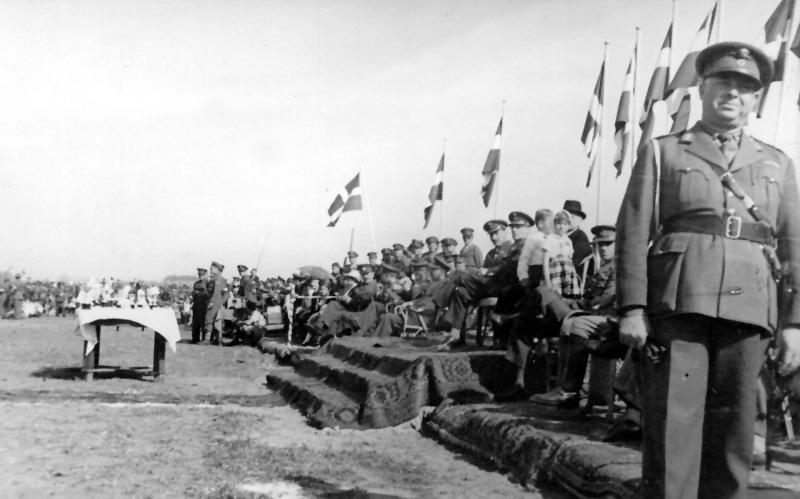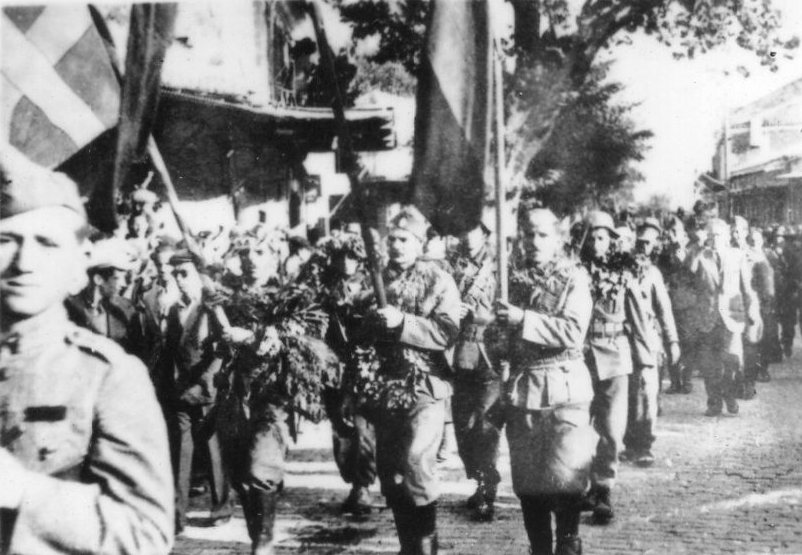|
Panhellenic Liberation Organization
The Panhellenic Liberation Organization ( el, Πανελλήνιος Απελευθερωτική Οργάνωσις (ΠΑΟ), ''Panellinios Apeleftherotiki Organosis'' (PAO)), was a Greek resistance organization against the Axis occupation of Greece. It was founded in 1941 by a group of Greek army officers, under the name Defenders of Northern Greece (Υπερασπισταί Βορείου Ελλάδος, YBE; ''Yperaspistai Voreiou Ellados'', ''YVE''), employing methods of non violent resistance. In 1943, YVE was renamed as the Panhellenic Liberation Organization (PAO), shifting its focus towards armed struggle. In the August of the same year it came into conflict with Greek People's Liberation Army (ELAS), a communist-led resistance organization. PAO was defeated in the ensuing civil war and its remnants turned towards collaboration with the Germans. Background On 28 October 1940, Italy declared war on Greece, expecting a swift victory but the invasion failed and the Italians ... [...More Info...] [...Related Items...] OR: [Wikipedia] [Google] [Baidu] |
Greco-Italian War
The Greco-Italian War (Greek language, Greek: Ελληνοϊταλικός Πόλεμος, ''Ellinoïtalikós Pólemos''), also called the Italo-Greek War, Italian Campaign in Greece, and the War of '40 in Greece, took place between the kingdoms of Fascist Italy (1922–1943), Italy and Kingdom of Greece, Greece from 28 October 1940 to 23 April 1941. This local war began the Balkans Campaign (World War II), Balkans Campaign of World War II between the Axis powers and the Allies of World War II, Allies and eventually turned into the Battle of Greece with Commonwealth of Nations, British and Nazi Germany, German involvement. On 10 June 1940, Italy declared war on France and the United Kingdom. By September 1940, the Italians had Italian invasion of France, invaded France, Italian conquest of British Somaliland, British Somaliland and Italian invasion of Egypt, Egypt. This was followed by a hostile press campaign in Italy against Greece, accused of being a British ally. A number of ... [...More Info...] [...Related Items...] OR: [Wikipedia] [Google] [Baidu] |
Free Greek Forces
After the fall of Greece to the Axis powers in April–May 1941, elements of the Greek Armed Forces managed to escape to the British-controlled Middle East. There they were placed under the Greek government in exile, and continued the fight alongside the Allies until the liberation of Greece in October 1944. These are known in Greek history as the Greek Armed Forces in the Middle East (Ελληνικές Ένοπλες Δυνάμεις Μέσης Ανατολής). Army In the face of the overwhelming German advance into Greece, several thousand Greek officers and soldiers were either evacuated, along with the Greek government, to Crete and then Egypt, in April–May 1941, or managed to flee, mainly via neutral Turkey, to the British-controlled Middle East. There a Greek army in exile started being formed, under British command and re-equipped with British arms. The core of this new military force was the "Phalanx of Egyptiote Greeks", from the Greek community in Egypt. On 15 Ju ... [...More Info...] [...Related Items...] OR: [Wikipedia] [Google] [Baidu] |
Pella (regional Unit)
Pella ( el, Περιφερειακή ενότητα Πέλλας) is one of the regional units of Greece, in the geographic region of Macedonia. It is part of the Region of Central Macedonia. It is named after the ancient city of Pella, the capital of ancient Macedonia and the birthplace of Alexander the Great. The capital of Pella is Edessa with a population of 19,036 inhabitants according to the census of 2011, while the largest town is Giannitsa. Other towns include Aridaia, Skydra, Arnissa and Krya Vrysi. Administration According to the 2011 census the population of the regional unit of Pella was 139,680. It is subdivided into 4 municipalities. These are: * Almopia (2) *Edessa (1) *Pella (3) *Skydra (4) Prefecture As a part of the 2011 Kallikratis government reform, the regional unit of Pella was created out of the former prefecture Pella ( el, Νομός Πέλλας). The prefecture had the same territory as the present regional unit. At the same time, the municipa ... [...More Info...] [...Related Items...] OR: [Wikipedia] [Google] [Baidu] |
Comintern
The Communist International (Comintern), also known as the Third International, was a Soviet Union, Soviet-controlled international organization founded in 1919 that advocated world communism. The Comintern resolved at its Second Congress to "struggle by all available means, including armed force, for the overthrow of the international bourgeoisie and the creation of an international Soviet republic (system of government), Soviet republic as a transition stage to the complete abolition of the state". The Comintern was preceded by the 1916 dissolution of the Second International. The Comintern held seven World Congresses in Moscow between 1919 and 1935. During that period, it also conducted thirteen Enlarged Plenums of its governing Executive Committee of the Communist International, Executive Committee, which had much the same function as the somewhat larger and more grandiose Congresses. Joseph Stalin, leader of the Soviet Union, dissolved the Comintern in 1943 to avoid antag ... [...More Info...] [...Related Items...] OR: [Wikipedia] [Google] [Baidu] |
George II Of Greece
George II ( el, Γεώργιος Βʹ, ''Geórgios II''; 19 July Old_Style_and_New_Style_dates">O.S.:_7_July.html" ;"title="Old_Style_and_New_Style_dates.html" ;"title="nowiki/>O.S.:_7_July">Old_Style_and_New_Style_dates.html"_;"title="nowiki/>Old_Style_and_New_Style_dates">O.S.:_7_July1890_–_1_April_1947)_was_O.S.:_7_July">Old_Style_and_New_Style_dates.html"_;"title="nowiki/>Old_Style_and_New_Style_dates">O.S.:_7_July1890_–_1_April_1947)_was_List_of_kings_of_Greece">King_of_Greece_from_September_1922_to_March_1924_and_from_November_1935_to_his_death_in_April_1947. The_eldest_son_of_King_Constantine_I_of_Greece.html" "title="List_of_kings_of_Greece.html" "title="Old Style and New Style dates">O.S.: 7 July">Old_Style_and_New_Style_dates.html" ;"title="nowiki/>Old Style and New Style dates">O.S.: 7 July1890 – 1 April 1947) was List of kings of Greece">King of Greece from September 1922 to March 1924 and from November 1935 to his death in April 1947. The eldest son of Kin ... [...More Info...] [...Related Items...] OR: [Wikipedia] [Google] [Baidu] |
Greek Government In Exile
The Greek government-in-exile was formed in 1941, in the aftermath of the Battle of Greece and the subsequent occupation of Greece by Nazi Germany and Fascist Italy. The government-in-exile was based in Cairo, Egypt, and hence it is also referred to as the "Cairo Government" ( el, Κυβέρνηση του Καΐρου). It was the internationally recognised government during the years of the Axis occupation of Greece. It was headed by King George II, who evacuated Athens in April 1941 after the German invasion of the country, first to the island of Crete and then to Cairo. He remained there until the German occupying forces withdrew from the country on 17 October 1944. The British wielded a significant amount of influence over the government-in-exile. Until 1944 it was also recognized as the legal Greek government by all Greek Resistance forces. In the occupied Greece, alongside the Axis-controlled collaborationist governments, a vigorous resistance movement developed. Its m ... [...More Info...] [...Related Items...] OR: [Wikipedia] [Google] [Baidu] |
National Liberation Front (Greece)
The National Liberation Front ( el, Εθνικό Απελευθερωτικό Μέτωπο, ''Ethnikó Apeleftherotikó Métopo'' (EAM) was an alliance of various political parties and organizations which fought to liberate Greece from Axis Occupation. It was the main movement of the Greek Resistance during the occupation of Greece. Its main driving force was the Communist Party of Greece (KKE), but its membership throughout the occupation included several other leftist and republican groups. ΕΑΜ became the first true mass social movement in modern Greek history. Its military wing, the Greek People's Liberation Army (ELAS), quickly grew into the largest armed guerrilla force in the country, and the only one with nationwide presence. At the same time, from late 1943 onwards, the political enmity between ΕΑΜ and rival resistance groups from the centre and right evolved into a virtual civil war, while its relationship with the British and the British-backed Greek government ... [...More Info...] [...Related Items...] OR: [Wikipedia] [Google] [Baidu] |
Venizelist
Venizelism ( el, Βενιζελισμός) was one of the major political movements in Greece from the 1900s until the mid-1970s. Main ideas Named after Eleftherios Venizelos, the key characteristics of Venizelism were: *Greek irredentism: The support of the Megali Idea. *Greek nationalism (liberal nationalism) *Liberal democracy: Venizelists represented upcoming urban classes that were against the old conservative establishment, which also had close ties with the palace. *Pro-Western: Alliance with the Entente against the Central Powers during WWI, and with the Allies during WWII. Also pro-Western during the Cold War, but later diverged with direct confrontation between Greek nationalist forces in Cyprus against British colonial forces. *Republicanism: Despite Venizelos' moderation regarding the monarchy, most of his supporters were in favour of a Republic, on the French standards. * Mixed economic policies: from economic liberalism to social democracy policies. * Anti-Bols ... [...More Info...] [...Related Items...] OR: [Wikipedia] [Google] [Baidu] |
Bulgarisation
Bulgarisation ( bg, българизация), also known as Bulgarianisation ( bg, побългаряване) is the spread of Bulgarian culture beyond the Bulgarian ethnic space. History A number of government policies are considered to be examples of Bulgarisation, including the attempt of the former communist leadership in the 1980s to assimilate a Turkish population of Bulgaria. During the Communist period of Bulgarian history, the Turkish minority (mainly across Bulgaria's east) of the country were forced to change their names from Turkish or Arabic to Bulgarian in 1984, during Todor Zhivkov's rule. Back then, as well as nowadays, the supporters of this policy refer to it as the "Revival Process", while critics call it "the so-called Vǎzroditelen process". Turkish culture and language as well as Islamic beliefs were also suppressed. The argument was that the Turkish population of Bulgaria were allegedly Bulgarians forced to convert to Islam during the Ottoman rule. [...More Info...] [...Related Items...] OR: [Wikipedia] [Google] [Baidu] |






